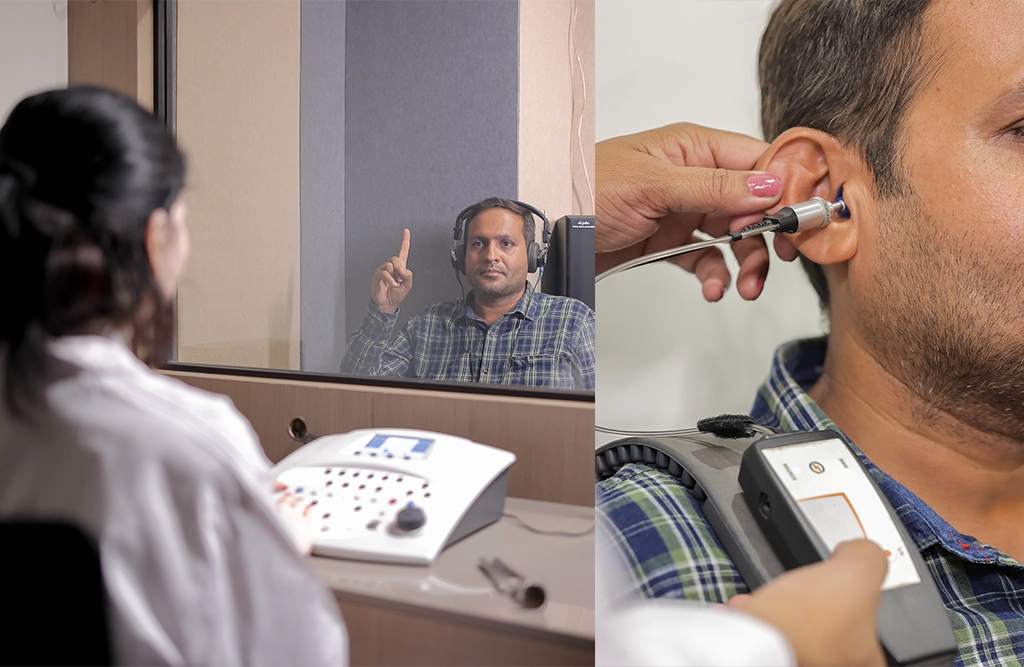
When it comes to hearing problems, audiological evaluation and management are key. In a traditional check-up, various tests are used to figure out if there’s any hearing loss and how severe it is. These tests can include listening to tones, understanding speech, checking the eardrum, and even measuring tiny sounds made by your inner ear. Once the tests are done, audiologists create a personalized plan to help. This might involve using hearing aids, special devices, learning new listening skills, getting advice, and ongoing support. The goal is to not just fix the hearing problem but also to make life easier, considering how you like to communicate and your lifestyle.
At Vatsalya, we offer the latest technology in hearing aids and provide free trials to patients. Our goal is to ensure that our team thoroughly comprehends the patient’s condition, enabling us to deliver satisfactory results.
We provide the world’s most advanced technology in hearing aids, including products from the top 10 companies globally. Vatsalya is Saurashtra’s only trusted hearing clinic.
01 . Pure tone audiometry
Pure tone audiometry is a simple test to check how well you hear different pitches or tones. During the test, you’ll wear headphones and sit in a quiet room. You’ll hear various beeps or tones at different volumes and frequencies. Your job is to signal when you hear each sound by pressing a button or raising your hand. This helps the audiologist create a graph, called an audiogram, showing which pitches you can hear and which ones you might struggle with. It’s like mapping out a road for your hearing, helping the audiologist understand your hearing abilities and any problems you might have.
02 . Immittance audiometry:
When you’re having trouble hearing, it’s not just about the sounds coming into your ear; it’s also about how well your ear is working on the inside. Immittance audiometry is a way to check the health of your middle ear, which is the part behind your eardrum. It involves three main tests:
These tests help audiologists understand if there are any issues with your middle ear that could be affecting your hearing. By knowing how your ear is working inside, they can recommend the best ways to help you hear better
03 . Special Hearing Tests:
Sometimes, standard hearing tests don’t give all the answers. That’s when special tests like SISI, Tone Decay, and ABLB come into play.
These tests might sound complicated, but they’re just ways for your audiologist to get a clearer picture of your hearing and tailor the right treatment for you.
04 . Speech Audiometry: Checking Your Hearing for Words
Speech audiometry is like a hearing test, but instead of just listening to beeps, you’ll hear words spoken at different volumes. The audiologist will ask you to repeat the words you hear. This helps them understand how well you can understand speech, not just sounds. It’s like a way to see if your ears can catch all the important details of what people are saying. By doing this test, audiologists can figure out how well your ears are working for everyday conversations and if there’s any trouble you might need help with.
05 . Tinnitus: Evaluation and Treatment
Tinnitus is that ringing or buzzing sound you might hear in your ears, even when there’s no external noise. When you’re bothered by tinnitus, doctors use tests to figure out what’s causing it and how it’s affecting you. These tests can include hearing checks and sometimes even scans to see inside your ears and brain. Once they know what’s going on, they can suggest ways to help you manage it. Treatment might involve things like using special devices to mask the sound, learning relaxation techniques to cope better, or sometimes even medication. The aim is to make the annoying sound less bothersome and improve your quality of life.
06 . Hearing aid trial, fitting and repair
When you try hearing aids, it’s like picking out the perfect pair of glasses for your ears. You’ll test different ones to find the best fit, and once you’ve chosen, the audiologist will make sure it feels comfortable and works just right for your hearing. If your hearing aid isn’t working, they can fix it up or replace any parts that need it. They can also make a custom ear mould that fits perfectly, like getting a tailored suit. And if you’re around loud noises a lot, like at work or concerts, they can make special earplugs just for you to keep your ears safe and comfy.